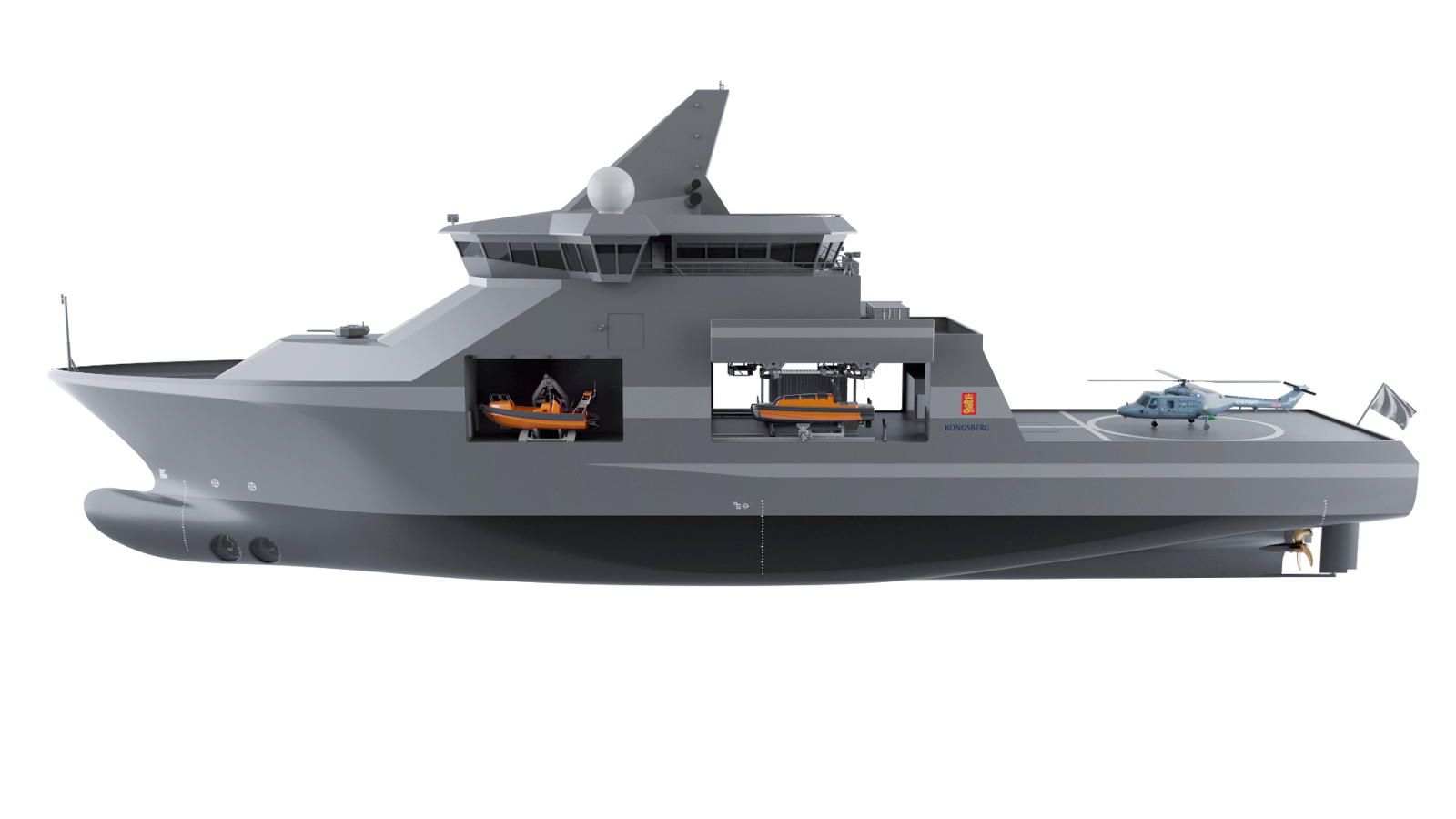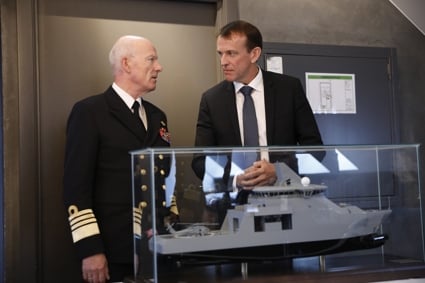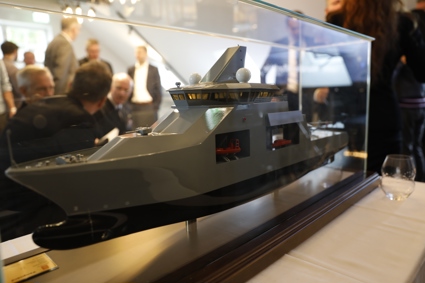
Unique naval vessel launched
Vanguard combines the best from civilian shipping with military technology. The result is a flexible naval vessel that costs a fraction of a frigate.
-
Text:Ove Ronny Haraldsen
Photo:Ove Ronny Haraldsen
The Norwegian Armed Forces Supreme Command was sitting in the front row when KONGSBERG presented the Vanguard system at Akershus Fortress in September.
Representatives of the international military technical press and Norwegian journalists were also present. They had come to see and hear about KONGSBERG's innovative thinking regarding the use of naval vessels.
This is because Vanguard represents a completely new way of organising a naval force. A naval force traditionally consists of various classes of vessel, such as frigates, corvettes, minesweepers and destroyers.
In Vanguard, KONGSBERG has developed a multi-role vessel that can be set up with different weapons and equipment packages, depending on the mission with which it is tasked. Vanguard therefore replaces a number of classes of vessel that are used by naval forces today.
“Vanguard can, for example, be equipped with Hugin underwater robots and sonars if the mission involves finding and destroying sea mines. If the mission involves denying adversaries access to a marine area, Naval Strike Missiles (NSM) can be placed on the ship’s deck,” explains Frank Tveiten, Vice President of IDS Naval.

“The Vanguard solution is definitely an interesting one. It combines different types of technology from the commercial world with technology from the defence side on a single platform,” said Chief of Defence and Admiral Haakon Bruun-Hanssen after the presentation.
INTERESTING SOLUTION, BELIEVES THE ARMED FORCES
Vanguard will fulfil the needs of a coastal nation as regards both military and civilian roles, such as search and rescue, port and asset protection, seabed monitoring and sovereignty enforcement, area denial challenges and submarine and mine hunting. The hanger on the vessel can house a helicopter, drones and/or unmanned surface vessels, and the various equipment packages can be swapped over relatively quickly.
“The Vanguard solution is definitely an interesting one. It combines different types of technology from the commercial world with technology from the defence side on a single platform,” said Chief of Defence and Admiral Haakon Bruun-Hanssen after the presentation.
The Norwegian Armed Forces are now working on a new long-term plan where administrative military and political leaders will determine how the armed forces of the future will be organised and equipped. In this context, technologies that reduce procurement costs and delivery times for military equipment will be highly relevant for Norway.

“In this regard, the system will give us more vessels for extensive marine areas than we could have had by purchasing specific military vessels. The idea and concept are something we want to look closely at; it is interesting, but it will be some time before we will be in a position to decide whether or not this solution is suitable for the Norwegian Armed Forces,” says Chief of Defence and Admiral Haakon Bruun-Hanssen.

Vanguard will fulfil the needs of coastal nations as regards both military and civilian roles. The hanger on the vessel can house a helicopter, drones and/ or unmanned surface vessels, and the various equipment packages can be swapped over relatively quickly.
BUILDING ON CIVILIAN SHIP DESIGN
Vanguard combines KONGSBERG’s knowledge, technology and systems with the expertise of the Norwegian maritime and offshore industry. Thanks to its design, Vanguard is particularly versatile and able to perform a wide variety of roles.
It has been designed with a multi-role hanger for air, surface and underwater operations. Vanguard will be able to operate with a crew of just 16–20. The ship design has been developed in partnership with Salt Ship Design, a process that began two years before Rolls-Royce Commercial Marine became part of KONGSBERG. According to Salt Ship Design, Vanguard could be built in two years.
“Vanguard will be based on a maritime civil notification, have a small crew and be very fuel-efficient,” says Frank Tveiten.
The use of mission modules that can easily be swapped over and the extensive use of unmanned vessels will enable roles and missions to be changed quickly. Vanguard is based on an open system architecture to enable new technology to be integrated and utilised as it becomes available.
ONE KONGSBERG
“The Vanguard system is largely based on civilian and commercial ship design, combined with flexible, military mission packages. The approach offers substantial cost savings compared with traditional, custom military solutions,” says Frank Tveiten.
KONGSBERG has been developing the Vanguard system for three years, based on a need expressed by a number of nations for multi-role vessels in the near future.
“Vanguard represents a dramatic change in marine operations. By combining our experience from the maritime, offshore and naval sectors, we believe this innovative system offers a very cost-effective solution to the needs of coastal nations,” says Eirik Lie, President of KONGSBERG Defence & Aerospace.

